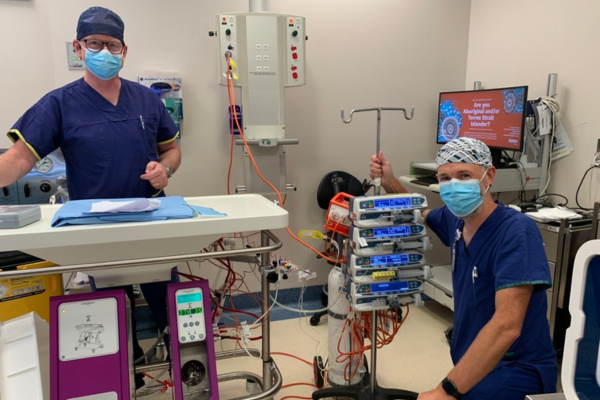About
Perfusion technology gives new hope to kidney transplant candidates
- Home
- About
- Latest news
- Perfusion technology gives new hope to kidney transplant candidates
[5].png)
6 June 2024
Austin Health achieved a significant milestone with our first normothermic machine perfusion (NMP) supported kidney transplant.
The transplant team was working with a kidney that had been declined by all Victorian transplant centres due to concerns about function. However, the donated kidney performed well on NMP, which perfused it with oxygenated blood and nutrients, effectively "waking up" the kidney from cold storage “hibernation”.
After seeing excellent results from perfusion and some urine production, the clinical team decided it was safe for transplantation into patient Huseyin, who had matched for the kidney.
The transplant
Huseyin had been waiting for a kidney transplant for two years, his life on hold as he spent hours in multiple dialysis sessions each week. A father of three, this intensive treatment impacted the whole family, with both Huseyin and his wife Ulfet stopping work to manage his care.
Since the transplant Huseyin has done exceptionally well, with his kidney function almost double what is normally achieved. Ulfet says the transplant marks the end of suffering, and the beginning of recovery and a new life. “We are forever grateful to the donor and think of that person every day. They saved his life,” she says.

Normothermic machine perfusion (NMP)
Surgeon Associate Professor Bulang He performed Huseyin's transplant. He explains NMP assesses kidney function, identifying those with serious damage and avoiding unsuitable transplants.
"NMP provides a platform close to human physiological environment. The kidney receives red blood cell-based circulation with some nutrients, so the kidney could be rejuvenated, and further assessed for its quality and viability."
Expanding the donor pool
This is the first time in Australia that NMP has been used to expand the donor pool. Medical Director of the Kidney Transplant Service Associate Professor John Whitlam says, “NMP helps us check and use kidneys that might otherwise be declined, turning potential missed opportunities into life-saving transplants."
If this kidney had gone unused, it would represent a lost opportunity cost of approximately $300,000 in dialysis over six years. The transplant also occurred at least a year earlier than Huseyin would have otherwise received a kidney.
By helping to identify organs that are safe to transplant, perfusion technology manages risks while expanding the donor pool. This is transformative for patients like Huseyin, improving access to treatment and putting them on the path to better health faster.
NMP joins hypothermic oxygenated machine perfusion as part of the comprehensive kidney machine perfusion program at Austin Health. Hypothermic oxygenated machine perfusion is available to Victorians and Tasmanians via the Victorian and Tasmanian Organ Retrieval Service (VICTORS).


